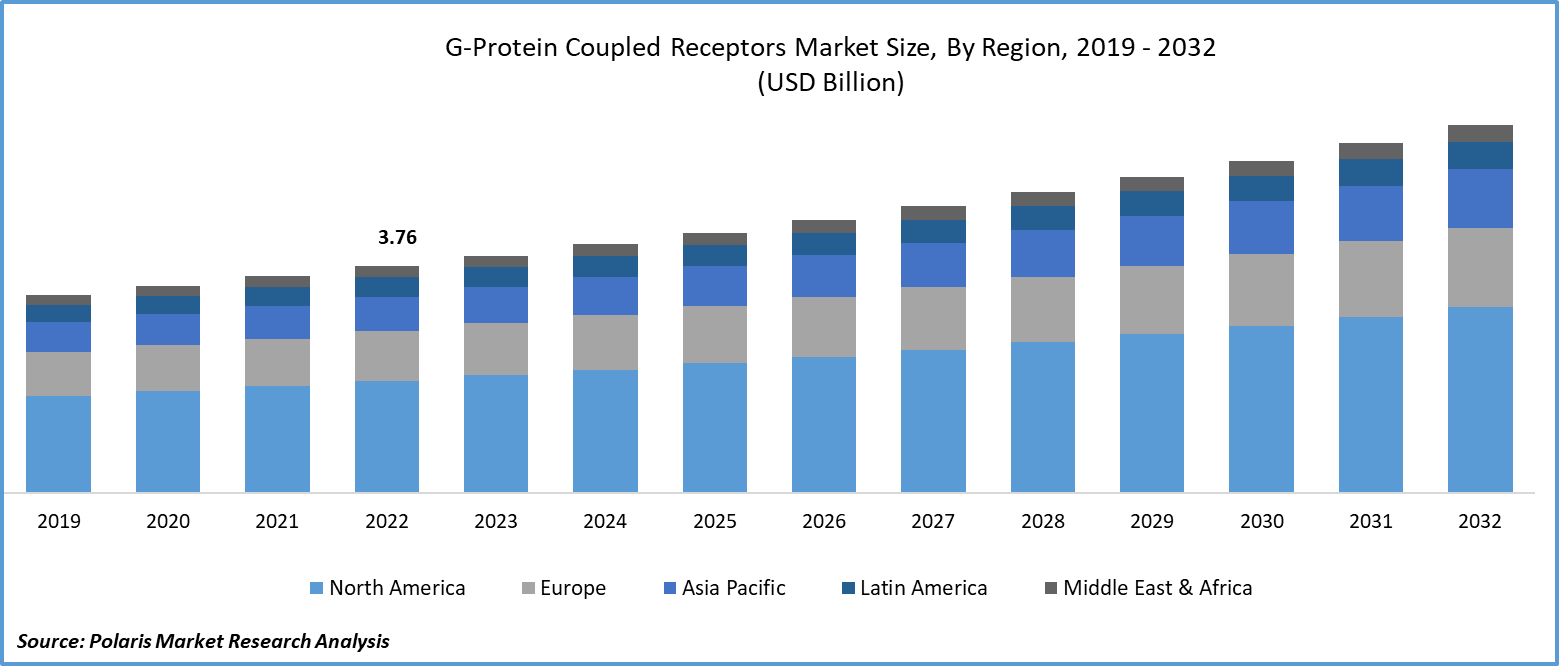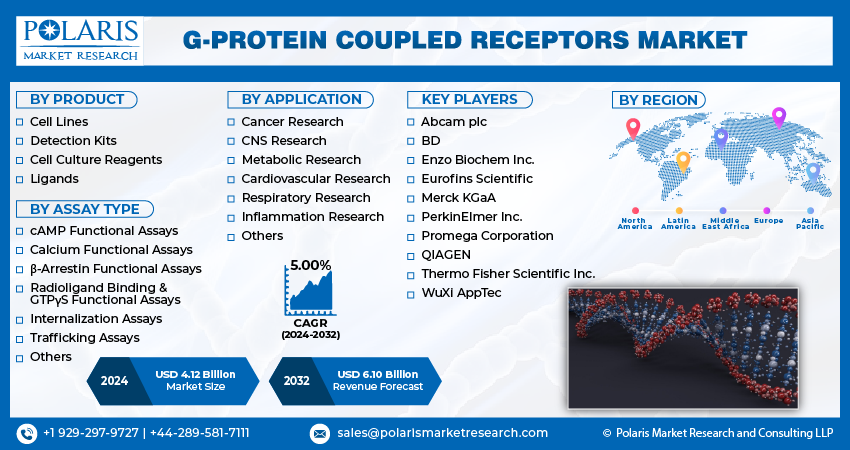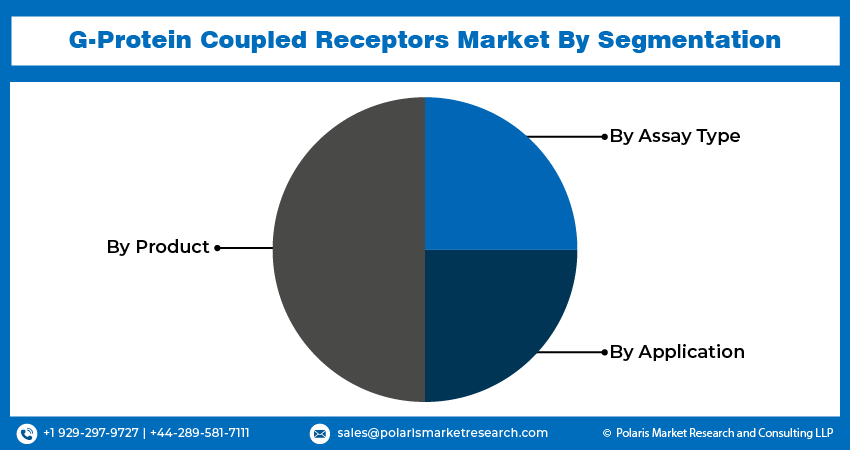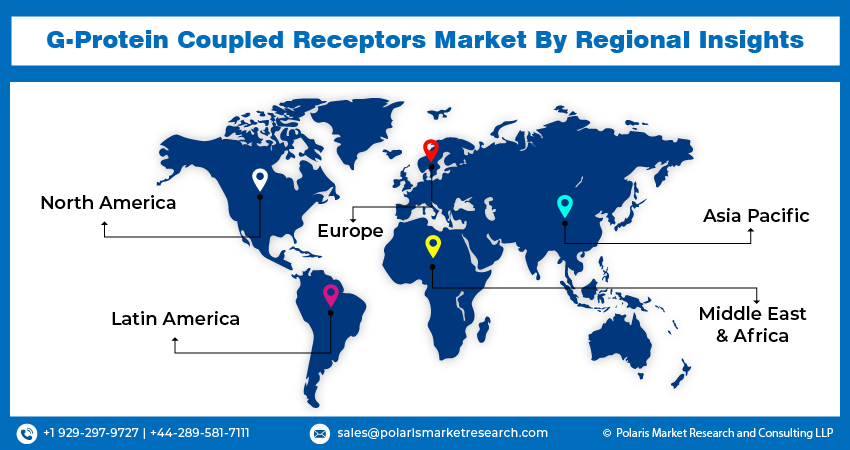
G-Protein Coupled Receptors Market Share, Size, Trends, Industry Analysis Report, By Product (Cell Lines, Detection Kits, Cell Culture Reagents, Ligands), By Assay Type, By Application, By Region, And Segment Forecasts, 2024 - 2032
- Published Date:Jan-2024
- Pages: 118
- Format: PDF
- Report ID: PM4093
- Base Year: 2023
- Historical Data: 2019-2022
Report Outlook
The global g-protein coupled receptors market was valued at USD 3.94 billion in 2023 and is expected to grow at a CAGR of 5.00% during the forecast period.
G-protein coupled receptors (GPCRs), commonly known as seven transmembrane receptors, play a vital role in binding chemicals and transmitting signals within the body. These receptors have been instrumental in identifying potential drug candidates, making them pivotal in the drug discovery process. The adoption of GPCRs in drug discovery is driven by the presence of numerous approved drugs and those undergoing clinical & pre-clinical studies. This growing array of drugs intensifies the demand for GPCR screening assays in drug development. Additionally, the rise in allosteric modulators, biological drugs, & biased agonists that target these receptors is further fueling the demand for these assays.

To Understand More About this Research: Request a Free Sample Report
The industry is poised for significant growth due to the increasing prevalence of lifestyle-related diseases like cancer, cardiovascular issues, and respiratory conditions. Governmental investments in research and development for new drugs and therapies serve as crucial drivers for this market. Furthermore, the ongoing development of drugs that specifically require and target these receptors further amplifies the market's expansion.
Drugs targeting GPCRs have demonstrated potential in alleviating COVID-19 symptoms, effectively reducing the pathogenic effects associated with the disease. In the early stages of the COVID-19 outbreak, these receptors played a crucial role in drug discovery, leading to substantial growth in this market. However, as the pandemic subsided and research and development activities slowed down, the market experienced a decline. Nevertheless, steady growth is anticipated in the forecast period.
Industry Dynamics
Growth Drivers
- Advancements in Drug Discovery Technologies
Cutting-edge innovations in high-throughput screening, structural biology, and computational modeling have revolutionized the identification and development of pharmaceutical agents targeting GPCRs. These technological strides have accelerated the drug discovery process, allowing for a more comprehensive understanding of GPCR structure and function and facilitating the design of highly specific and potent ligands. The convergence of these advancements has not only expedited the development of new GPCR-targeted therapeutics but has also contributed to a more nuanced and personalized approach to drug design, fostering a robust environment for growth and innovation in the g-protein coupled receptors market.
Companies in the GPCR market are increasingly emphasizing research to delve into the unique biological functions of both approved and withdrawn drug candidates. These investigations aim to uncover additional applications for these compounds beyond their originally intended uses. An example of this research-focused approach is demonstrated by Arena Pharmaceuticals, which conducted a study utilizing a specially designed oligo-nucleotide GPCR chip. In this research, Arena Pharmaceuticals employed a custom-designed chip to analyze GPCRs. The study identified the relative expression of around 700 receptors that hold high therapeutic significance. These receptors are pivotal in various physiological processes within the human body.

Report Segmentation
The market is primarily segmented based on product, assay type, application, and region.
|
By Product |
By Assay Type |
By Application |
By Region |
|
|
|
|
To Understand the Scope of this Report: Speak to Analyst
By Product Analysis
- Cell lines segment accounted for the largest market share in 2022
The cell lines segment held the largest revenue share. Cell lines are pivotal components in cellular impedance assays designed to detect GPCR targets. These assays involve measuring the changes in impedance, or opposition to the flow of an electric current, as cells interact with different compounds or ligands. Different cell lines are engineered to express specific GPCRs, allowing researchers to study the interactions between these receptors and various substances. This detailed analysis is crucial in drug discovery, enabling scientists to identify potential drug candidates and understand their effects on GPCR pathways.
Detection kits are expected to register a steady growth rate. These kits have become increasingly popular in recent times due to their user-friendly nature, durability, and high sensitivity, making them valuable tools for assessing activity across various pathways. Furthermore, the adoption of novel detection methods that rely on non-labeled systems, like resonance wave-guide grating or impedance-based sensors, is expected to bolster the growth of this segment further.
By Assay Type Analysis
- cAMP functional assays segment held the significant market share
cAMP functional assays segment held the majority market share. This is due to the pivotal role of cyclic Adenosine Monophosphate (cAMP) as a crucial intracellular second messenger in GPCR signal transduction. The availability of a wide array of reagent kits designed for measuring cAMP messenger levels has substantially contributed to the robust growth of this segment. The calcium functional assay segment will grow at a rapid pace. This is due to the benefits linked with calcium flux assays, including their high sensitivity, ease of measuring calcium flux, and user-friendly configurability.
By Technology Analysis
- Cancer research segment held the largest share of the market in 2022
The cancer research segment garnered the largest share. G-protein coupled receptor activity has a multitude of applications in treating various disorders, particularly in cancer research. GPCR activity plays a significant role in detecting tumor angiogenesis and immunotherapy-related responses. These receptors, being widely expressed proteins, facilitate intercellular communication and pave the way for potential therapeutic developments. Utilizing GPCR assays in cancer research significantly contributes to generating substantial revenue in this sector.
Multiple research studies have confirmed that G-protein coupled receptor (GPCR) activity plays a crucial role in indicating tumor growth, invasiveness, angiogenesis, metastasis, and drug resistance in cancer patients. Research findings reveal that a common set of GPCRs is expressed in every product of cancer cells or tumors. Additionally, it has been observed that certain cell products express over 150 different GPCRs, with one being significantly elevated in expression.
The inflammation research segment will grow at a substantial pace. In recent years, the significance of this receptor has grown in the field of inflammation research. G-protein coupled receptor kinases play a regulatory role in signaling pathways, including the nuclear factor κ-B signaling pathway, which is associated with diverse inflammatory processes. Consequently, these signaling pathways serve as potential therapeutic targets for various inflammatory diseases.

Regional Insights
- North America dominated the global market in 2022
North America emerged as the largest region. This dominance can be attributed to strategic investments made in cancer research, the approval of drugs targeting GPCRs, and heightened emphasis on drug discovery and development activities within the region. The 2021 Journal of the American Heart Association predicts that over 130 million adults in the United States will likely experience some form of heart disease by 2035. Additionally, as per the February 2022 report from the Heart and Stroke Foundation of Canada, 750,000 individuals are currently dealing with heart failure in Canada, and 100,000 people receive a diagnosis for this incurable condition annually.
Asia Pacific region will grow rapidly. The region's expansion is propelled by various initiatives undertaken by these companies to enhance their market presence. Furthermore, the increasing prevalence of lifestyle-related disorders in populous countries such as India & China has created a demand for effective treatments involving receptors, further fueling regional growth.

Key Market Players & Competitive Insights
The G-protein coupled Receptors (GPCRs) market is characterized by intense competition and dynamic trends, driven by a combination of factors such as technological advancements, strategic collaborations, and a focus on diverse therapeutic applications. Key industry players are engaged in continuous research and development efforts to introduce innovative GPCR-targeted therapies, enhancing their product portfolios and maintaining a competitive edge. Additionally, the market witness’s fierce competition in terms of regulatory approvals and market penetration as companies strive to capitalize on the expanding range of GPCR-related disorders.
Some of the major players operating in the global market include:
- Abcam plc
- BD
- Enzo Biochem Inc.
- Eurofins Scientific
- Merck KGaA
- PerkinElmer Inc.
- Promega Corporation
- QIAGEN
- Thermo Fisher Scientific Inc.
- WuXi AppTec
Recent Developments
- In December 2022, Sosei Group collaborated with the Eli Lilly. The partnership is focused on advancing drug discovery efforts related to new GPCR targets associated with diabetes and metabolic diseases. The collaboration will involve the development and commercialization of small molecules with therapeutic potential in these areas.
- In August 2022, Sosei Group & AbbVie partnered to focus on drug discovery. This collaboration aims to identify, develop, & commercialize small molecules that can efficiently modulate newly discovered GPCR targets linked to neurological diseases.
- In December 2021, Tectonic Therapeutics officially launched following a successful Series A funding round that raised USD 80 million. The company's mission is to transform the exploration and development of innovative therapies that focus on GPCRs.
- In January 2022, Septerna, Inc. secured USD 100 million in Series A funding to advance GPCR-targeted medicines through its innovative Native Complex Platform. This platform addresses historical challenges, enabling the exploration of untapped GPCR drug targets for various diseases.
G-Protein Coupled Receptors Market Report Scope
|
Report Attributes |
Details |
|
Market size value in 2024 |
USD 4.12 billion |
|
Revenue forecast in 2032 |
USD 6.10 billion |
|
CAGR |
5.00% from 2024 – 2032 |
|
Base year |
2023 |
|
Historical data |
2019 – 2022 |
|
Forecast period |
2024 – 2032 |
|
Quantitative units |
Revenue in USD billion and CAGR from 2024 to 2032 |
|
Segments covered |
By Product, By Assay Type, By Application, By Region |
|
Regional scope |
North America, Europe, Asia Pacific, Latin America; Middle East & Africa |
|
Customization |
Report customization as per your requirements with respect to countries, region and segmentation. |
